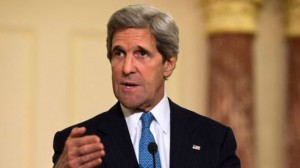[caption id="attachment_29783" align="alignright" width="210"] US Secretary of State John Kerry[/caption]
US Secretary of State John Kerry[/caption]
(Reuters) - Syrian refugees angrily told U.S. Secretary of State John Kerry on Thursday that the United States should set up a no-fly zone and safe havens in Syria to protect them.
Visiting a camp that holds roughly 115,000 Syrian refugees in Jordan about 12 km (eight miles) from the Syrian border, Kerry spent about 40 minutes with half a dozen refugees who vented their frustration at the international community's failure to end Syria's more than two-year-old civil war.
He told them Washington was considering various options, including buffer zones for their protection, but that the situation was complex and much was still under consideration.
"Where is the international community? What are you waiting for?" a Syrian woman, who did not give her name, told Kerry at the United Nations' Zaatari refugee camp. "We hope that you will not go back to the States before you find a solution to the crisis. At least impose a no-fly zone or an embargo.
"The U.S., as a superpower, can change the equation in Syria in 30 minutes after you return to Washington."
Waving a pen in the air and tapping it on the table, the woman referred to the Muslim fasting month of Ramadan, which ends in three weeks. She said: "Mr. Secretary, if the situation remains unchanged until the end of Ramadan this camp will become empty. We will return to Syria and we will fight with knives.
"You, as the U.S. government look to Israel with respect. Cannot you do the same with the children of Syria?
NOT "CUT AND DRY"
Kerry made an aerial tour of the tents and pre-fabricated, container-like homes that form by far the biggest camp for Syrians in Jordan. Meeting refugees afterward in a fenced-off administrative section, he acknowledged the anger.
"They are frustrated and angry at the world for not stepping in and helping," Kerry told reporters.
"I explained to them I don't think it's as cut and dry and as simple as some of them look at it. But if I were in their shoes I would be looking for help from wherever I could find it."
Kerry did not enter the area of the vast camp where the refugees live, but kept to the adjacent, fenced-off administrative area where humanitarian officials work and live. The half dozen refugees came to meet Kerry in a conference room within the administrative zone.
"We are not satisfied with the American answer. We never were. We just need ... action," a second woman told reporters after meeting Kerry.
During the meeting, Kerry told the refugees that many young Americans had died or lost their limbs "fighting for the freedom of Iraq" and "fighting for the freedom of Afghanistan".
After the request for buffer and no-fly zones, Kerry said: "A lot of different options are under consideration. I wish it was very simple. As you know, we've been fighting two wars for 12 years. We are trying to help in various ways, including helping Syrian opposition fighters have weapons.
"We are doing new things. There is consideration of buffer zones and other things but it is not as simple as it sounds."
U.S. EFFORTS
Kerry noted U.S. concerns about the help being given to Syrian President Bashar al-Assad by Iran and its Lebanese ally Hezbollah. He also lamented divisions among the opposition.
"It is very unfortunate and very sad to see that the opposition is not in agreement," he said. "People are being slaughtered. Women are being raped.
"Everyone looks at what the opposition is doing and then forgets the crimes of Bashar al-Assad."
He said President Barack Obama's administration was doing all it could, including helping the refugees in Jordan.
"President Obama, I think two months ago, made a decision to significantly increase American assistance in many different ways," Kerry said. "And we are doing everything we can to help Syrians be able to fight for Syria."
Noting U.S. aid to the camp, he added: "You are not abandoned. We are very aware of how terrible conditions are inside Syria.
"I promise you I will take your voices and concerns back with me to Washington as we continue to work with our friends in ways that can be helpful."
Jordan has been host to big U.N. camps for Palestinian refugees for more than six decades.
The administrator at Zaatari, Kilian Kleinschmidt, was asked by reporters how long his camp would remain open for Syrians. He replied: "Three days. Thirty years. Who knows?"
By Reuters
The Iran Project is not responsible for the content of quoted articles.

 QR code
QR code